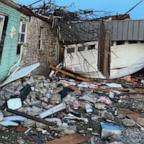Army officials: Brain injuries overdiagnosed
WASHINGTON -- The Pentagon and Department of Veterans Affairs are overemphasizing mild traumatic brain injury among combat troops at the expense of other medical problems that are going untreated, two Army mental health researchers say in an article that has raised intense objections from other scientists studying the condition.
Cols. Charles Hoge and Carl Castro say the military should scrap screening questions meant to uncover cases of mild TBI among troops returning from combat. Most troops who suffered a concussion in battle have recovered, they say.
Any more symptoms are due to depression, post traumatic stress disorder or substance abuse, Hoge and Castro say, so troops do not get care they need because of an overemphasis on mild TBI.
Their article, published today in The New England Journal of Medicine, says the Pentagon and VA are relying on flawed science to identify what the Pentagon estimates may be up 360,000 cases of brain injury suffered by veterans of the wars in Iraq and Afghanistan. Hoge and Castro have conducted some of the military's early and influential research on conditions such as PTSD.
Their arguments have convinced the Army's surgeon general, Gen. Eric Schoomaker, that the screening should be changed, says Schoomaker's spokeswoman, Cynthia Vaughan. But they also drew criticism from government and private brain-injury researchers who disagree with their findings and recommendations, which they say could leave injured troops without proper care.
It's too early to say that most troops recover from mild TBI as Hoge and Castro assert, says John Corrigan, an Ohio State University psychiatrist and researcher who advised the VA on its screening process. Without screening, troops with mild TBI risk may wind up like former professional football players who developed long-term neurological problems after suffering too many concussions, says David Hovda, director of the Brain Injury Research Center at UCLA.
With the advent of body armor and armor-plated vehicles, troops survive roadside bomb blasts in Iraq and Afghanistan, only to return home with issues ranging from headaches to problem-solving difficulties. From 2005 forward, a rising chorus of experts, such as the Defense and Veterans Brain Injury Center, urged that troops be screened for brain injuries and if diagnosed, funneled into specialized care.




